In the rapidly evolving world of indie developing, where staying ahead of the curve is more challenging than ever, standing out feels like trying to shout in a crowded stadium.
With the market getting more crowded every day, founders and companies need to get creative to catch customers’ attention and keep them hooked.
That’s where AI swoops in.
This game-changing technology is flipping the script on how indie developers and small companies do marketing, offering innovative ways to rise above the noise.
AI has the power to transform every aspect of your SaaS marketing efforts, from content creation and personalization to predictive analytics and customer service.
By leveraging AI tools and techniques, you can streamline your marketing processes, gain deeper insights into your target audience, and deliver more effective campaigns that drive growth and customer satisfaction.
In this comprehensive guide, we’ll explore how to harness the power of AI to supercharge the marketing for your SaaS app. We’ll delve into various AI applications, provide practical strategies for implementation, and showcase examples of cutting-edge tools that can help you stay ahead of the curve.
Whether you’re a startup founder or a seasoned marketing professional, this article will equip you with the knowledge and resources you need to leverage AI and take your SaaS marketing to the next level.

Understanding AI in SaaS Marketing
Artificial Intelligence has become a cornerstone of modern marketing strategies, offering unprecedented capabilities for data analysis, automation, and personalization.
In the context of SaaS marketing, AI refers to the use of machine learning algorithms and other intelligent systems to analyze vast amounts of data, make predictions, and automate various marketing tasks.
The application of AI in SaaS marketing can be broadly categorized into several key areas:
Data Analysis and Insights:
AI algorithms can process and analyze large datasets to uncover patterns, trends, and customer behaviors that would be difficult or impossible for humans to identify manually.
Automation:
AI-powered tools can automate repetitive tasks, freeing up marketers to focus on strategy and creativity.
Personalization:
By analyzing user data and behavior, AI can help deliver highly personalized experiences, content, and recommendations to individual customers.
Predictive Analytics:
AI models can forecast future trends, customer behaviors, and potential outcomes, enabling more informed decision-making.
Natural Language Processing (NLP):
This branch of AI enables machines to understand and generate human language, powering tools like chatbots and content generation systems.
By leveraging these AI capabilities, SaaS companies can enhance their marketing efficiency, improve customer experiences, and gain a competitive edge in the market.

AI-Powered Content Creation
Content creation is a crucial aspect of SaaS marketing, but it can be time-consuming and resource-intensive.
AI-powered tools are revolutionizing this process, enabling marketers to create high-quality content more efficiently and at scale.
Key applications of AI in content creation include:
Blog Post and Article Generation:
AI writing assistants can help create initial drafts, generate outlines, or even produce complete articles based on given prompts or topics.
While human oversight is still necessary for quality control and adding a personal touch, these tools can significantly speed up the content creation process.
- Example Tool: Jasper.ai
Social Media Content:
AI can analyze trending topics, generate post ideas, and even create social media copy tailored to different platforms.
- Example Tool: Copy.ai
Video Script Writing:
AI can assist in creating scripts for marketing videos, product demos, and explainer content.
- Example Tool: UGC Scripts
Email Subject Lines and Body Copy:
AI tools can generate compelling email subject lines and body content, optimizing for open rates and engagement.
- Example Tool: Phrasee
Ad Copy Generation:
AI can create variations of ad copy for A/B testing and optimize based on performance data.
- Example Tool: Persado
Content Personalization:
AI algorithms can dynamically adjust content based on user preferences, behavior, and demographics.
- Example Tool: Dynamic Yield
While AI-generated content can be incredibly useful, it’s important to note that human creativity, strategic thinking, and editing are still crucial.
AI should be viewed as a powerful assistant rather than a replacement for human content creators.
The most effective approach is often a combination of AI-generated content and human expertise, ensuring that the final output aligns with your brand voice and marketing goals.
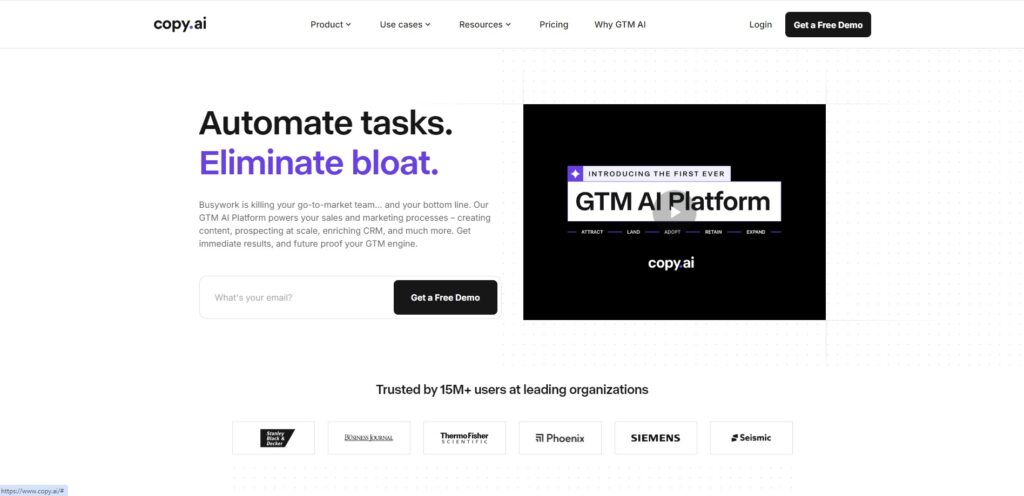
Personalization and Customer Segmentation
In the competitive SaaS landscape, delivering personalized experiences to your customers can significantly enhance engagement, conversion rates, and loyalty.
AI is revolutionizing personalization and customer segmentation by enabling more granular, dynamic, and accurate targeting.
Some key aspects of AI-driven personalization and segmentation:
Dynamic Segmentation:
AI algorithms can continuously analyze customer data to create and update segments in real-time, based on behaviors, preferences, and other relevant factors.
- Example Tool: Segment.com
Predictive Personalization:
AI can anticipate customer needs and preferences. This allows you to proactively offer relevant content, features, or offers.
- Example Tool: Optimizely
Behavioral Targeting:
By analyzing user interactions with your app or website, AI can help tailor experiences based on individual user behavior patterns.
- Example Tool: Amplitude
Content Recommendations:
AI-powered recommendation engines can suggest relevant content, features, or products to users based on their past interactions and similar user profiles.
- Example Tool: Recombee
Personalized Email Marketing:
AI can help segment email lists and personalize email content, subject lines, and send times for maximum engagement.
- Example Tool: Sailthru
Dynamic Pricing:
AI algorithms can adjust pricing strategies based on user segments, market demand, and competitor analysis.
- Example Tool: Prisync
In-App Personalization:
AI can customize the user interface, feature highlighting, and in-app messaging based on individual user preferences and usage patterns.
- Example Tool: Appcues
Implementing AI-driven personalization and segmentation can lead to improved customer experiences, higher conversion rates, and increased customer lifetime value.
However, it’s crucial to balance personalization with privacy concerns and ensure compliance with data protection regulations like GDPR and CCPA.
By utilizing these AI capabilities, SaaS founders can create more targeted, relevant, and effective marketing campaigns that align with their audience on a personal level.
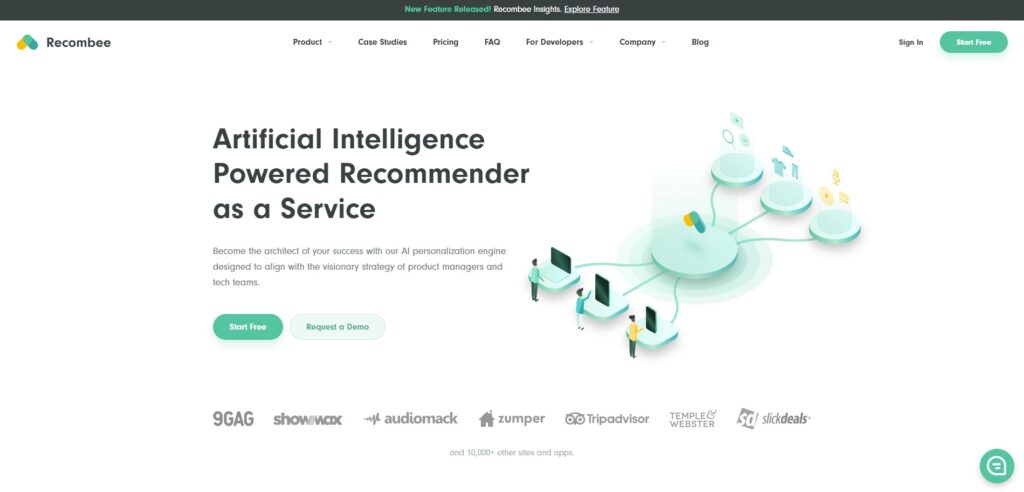
Predictive Analytics and Lead Scoring
Predictive analytics and lead scoring are powerful AI applications that can significantly enhance the efficiency and effectiveness of your SaaS marketing efforts.
By using historical data and machine learning algorithms, these tools can forecast future trends and identify the most promising leads, allowing for more targeted and efficient marketing strategies.
Key aspects of AI-driven predictive analytics and lead scoring include:
Lead Qualification:
AI algorithms can analyze various data points to determine which leads are most likely to convert. This allows sales teams to focus their efforts on high-potential prospects.
- Example Tool: Leadspace
Churn Prediction:
AI models can identify patterns that indicate a customer is likely to churn, enabling proactive retention efforts.
- Example Tool: Akkio
Customer Lifetime Value (CLV) Prediction:
AI can forecast the long-term value of customers, helping prioritize acquisition and retention efforts.
- Example Tool: Custify
Demand Forecasting
AI-powered predictive analytics can help anticipate market demand, allowing for more effective resource allocation and marketing planning.
- Example Tool: Dataiku
Dynamic Lead Scoring
AI can continuously update lead scores based on new data and interactions, providing a real-time view of lead quality.
- Example Tool: MadKudu
Opportunity Scoring:
For B2B SaaS companies, AI can assess the likelihood of closing deals in the pipeline, helping sales teams prioritize their efforts.
- Example Tool: Clari
Next Best Action Prediction:
AI can suggest the most effective next steps in nurturing a lead or engaging a customer based on historical data and current behavior.
- Example Tool: Pega
Implementing AI-driven predictive analytics and lead scoring can lead to more efficient use of marketing and sales resources, higher conversion rates, and improved customer retention.
It’s also important to regularly review and refine these models to ensure they remain accurate and aligned with your business goals.
Using these AI capabilities, SaaS companies can make more informed decisions, allocate resources more effectively, and ultimately drive better marketing and sales outcomes.
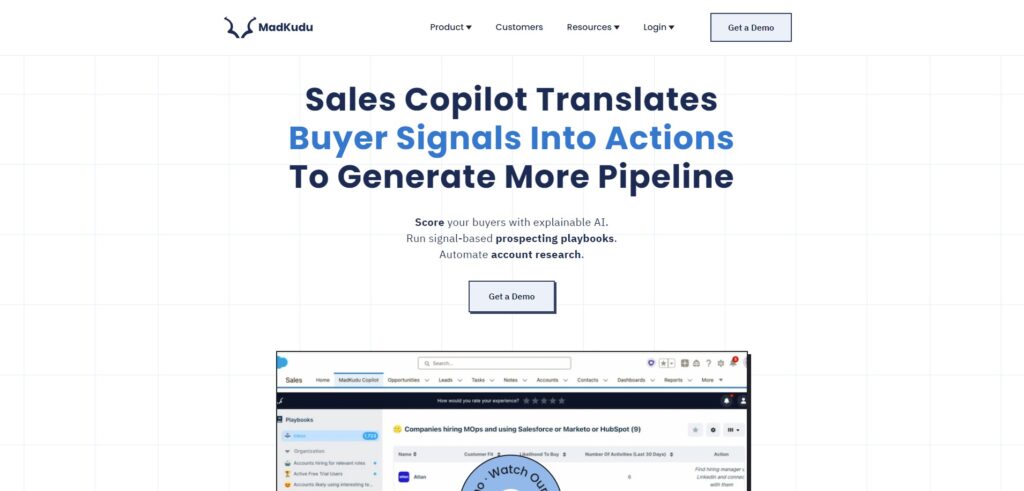
Chatbots and Customer Service
AI-powered chatbots and customer service solutions are transforming how SaaS companies interact with their users.
Chatbots provide instant, 24/7 support and can enhance the overall customer experience.
Significantly reducing response times, handling routine inquiries, and freeing up human agents to focus on more complex issues are a few of their benefits.
The key applications of AI in chatbots and customer service include:
Intelligent Virtual Assistants:
AI-driven chatbots can handle a wide range of customer inquiries, from basic FAQs to more complex troubleshooting.
- Example Tool: Intercom
Natural Language Processing (NLP):
Advanced NLP allows chatbots to understand and respond to user queries in a more human-like manner.
- Example Tool: DialogFlow
Sentiment Analysis:
AI can analyze customer sentiment in real-time during interactions, allowing for appropriate escalation or intervention when necessary.
- Example Tool: IBM Watson Tone Analyzer
Predictive Customer Service:
AI can anticipate potential issues based on user behavior and proactively offer solutions.
- Example Tool: Zendesk
Multilingual Support:
AI-powered translation capabilities enable chatbots to provide support in multiple languages.
- Example Tool: Language I/O
Voice-Enabled Assistants:
AI can power voice-based customer service interactions, enhancing accessibility and user experience.
- Example Tool: Nuance Communications
Automated Ticket Routing:
AI can analyze support tickets and route them to the most appropriate department or agent based on the content and urgency.
- Example Tool: SupportBee
Implementing AI-driven chatbots and customer service solutions can lead to improved response times, increased customer satisfaction, and more efficient use of support resources.
However, it’s crucial to strike a balance between automation and human touch, ensuring that customers can easily escalate to human agents when needed.
SaaS companies can use tools like this for more responsive, personalized, and efficient customer support. All of which are great for user satisfaction and retention rates.
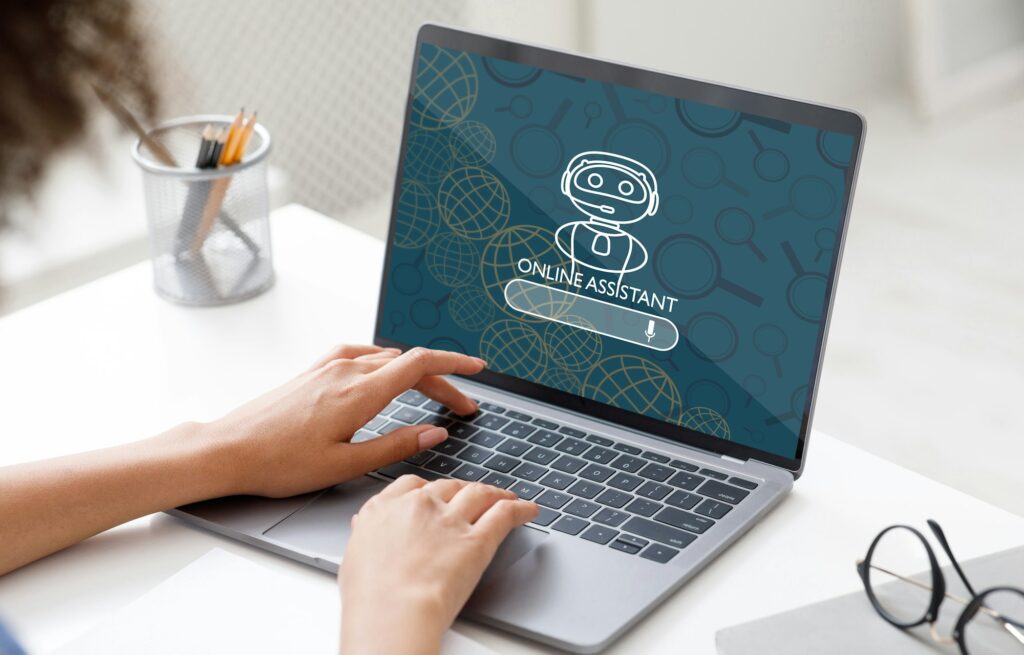
AI for Social Media Marketing
Social media remains a crucial channel for SaaS marketing, and AI is revolutionizing how companies approach their social media strategies.
From content creation to audience targeting and performance analysis, AI tools can significantly enhance the effectiveness of social media marketing efforts.
Let’s look at some key applications:
Content Generation:
AI can assist in creating engaging social media posts, captions, and even images tailored to specific platforms.
- Example Tool: Lately.ai
Optimal Posting Times:
AI algorithms can analyze past performance data to determine the best times to post for maximum engagement.
- Example Tool: Sprout Social
Hashtag Recommendations:
AI can suggest relevant and trending hashtags to increase the visibility of your posts.
- Example Tool: RiteTag
Sentiment Analysis:
AI-powered tools can monitor brand mentions and analyze sentiment across social platforms, providing valuable insights into brand perception.
- Example Tool: Brandwatch
Influencer Identification:
AI can help identify and evaluate potential influencers who align with your brand and have engaged audiences in your niche.
- Example Tool: Upfluence
Ad Targeting:
AI algorithms can optimize social media ad targeting based on user behavior, interests, and demographics.
- Example Tool: Albert.ai
Performance Prediction:
AI can forecast the potential performance of social media content before it’s published, allowing for optimization.
- Example Tool: Sprinklr
Social Listening:
AI-powered tools can monitor social media platforms for relevant conversations, trends, and opportunities for engagement.
- Example Tool: Mention
Automated Social Customer Service:
AI chatbots can be integrated into social media platforms to provide instant customer support.
- Example Tool: Emplifi
Implementing AI in social media marketing can lead to more engaging content, better targeting, and improved ROI on social media efforts.
Still, it’s important to maintain a human touch in your social media presence. Use AI as a tool to enhance authentic interactions, rather than replace.
By leveraging these AI capabilities, SaaS companies can create more effective social media strategies, engage with their audience more meaningfully, and gain valuable insights to inform their overall marketing approach.
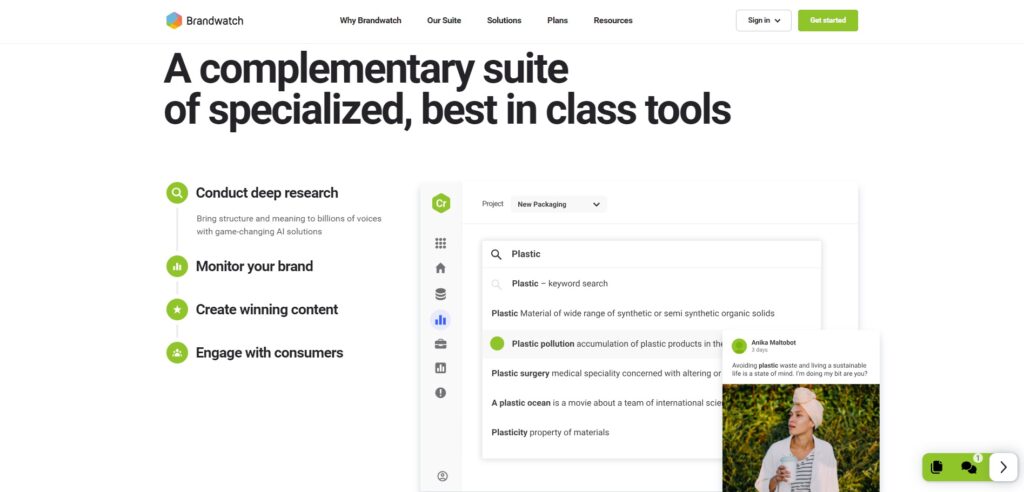
Email Marketing Optimization
Email marketing is still a cornerstone of SaaS marketing strategies, and AI is transforming how companies approach this channel.
From personalization to timing and content optimization, AI tools can boost the effectiveness of email campaigns.
Key applications:
Subject Line Optimization:
AI can generate and test multiple subject lines to determine which ones are most likely to improve open rates.
- Example Tool: Phrasee
Content Personalization:
AI algorithms can dynamically adjust email content based on individual recipient preferences, behavior, and demographics.
- Example Tool: Persado
Send Time Optimization:
AI can analyze recipient behavior to determine the optimal time to send emails for each individual subscriber.
- Example Tool: Seventh Sense
Dynamic Email Content:
AI can automatically update email content in real-time based on factors like location, device, or time of open.
- Example Tool: Movable Ink
A/B Testing:
AI can conduct sophisticated multivariate testing to optimize various elements of email campaigns.
- Example Tool: Optimail
Automated Workflows:
AI can create and optimize complex email sequences based on user behavior and engagement.
- Example Tool: ActiveCampaign
Spam Filter Evasion:
AI tools can analyze email content and suggest modifications to improve deliverability.
- Example Tool: Email on Acid
Implementing AI in email marketing can lead to higher open rates, improved click-through rates, and ultimately better conversion rates.
Just remember it’s crucial to maintain a balance between automation and personalization to ensure your emails still feel authentic and valuable.
Utilizing these AI capabilities, SaaS companies can create more targeted, timely, and effective email campaigns that stick with their audience and drive engagement.
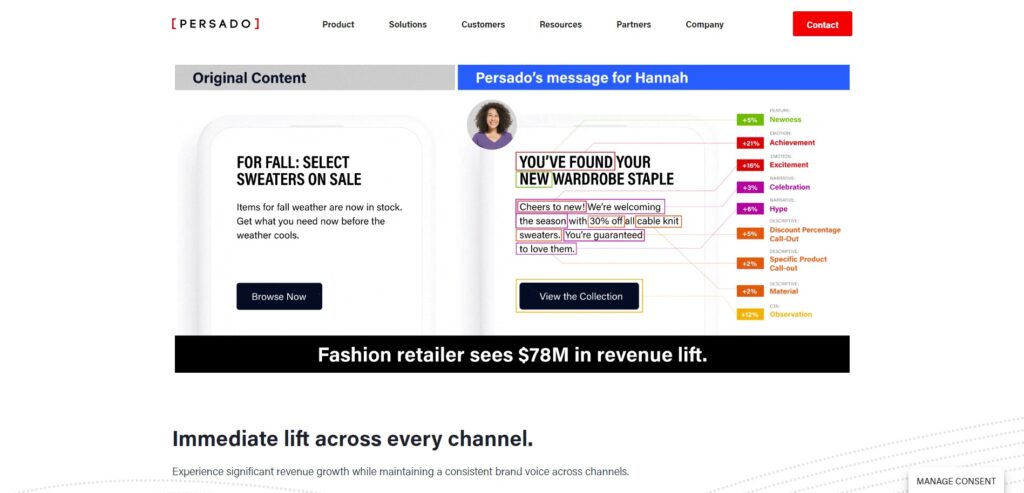
AI-Driven Advertising
AI is revolutionizing digital advertising, enabling SaaS builders to create more targeted, efficient, and effective ad campaigns.
From ad creation to placement and optimization, AI tools can increase the performance of advertising efforts across various platforms.
AI in advertising key applications:
Programmatic Advertising:
AI algorithms can automate the buying, placement, and optimization of ads in real-time.
- Example Tool: The Trade Desk
Ad Creative Generation:
AI can assist in creating multiple variations of ad copy and visuals for testing.
- Example Tool: Adext AI
Predictive Bidding:
AI can forecast the optimal bid amount for ad placements based on historical data and real-time market conditions.
- Example Tool: Google’s Smart Bidding
Audience Targeting:
AI can analyze vast amounts of data to identify and target the most relevant audiences for your ads.
- Example Tool: Albert.ai
Dynamic Ad Creation:
AI can automatically generate personalized ads based on user data and behavior.
- Example Tool: Smartly.io
Cross-Channel Optimization:
AI can manage and optimize ad performance across multiple channels and platforms simultaneously.
- Example Tool: Acquisio
Fraud Detection:
AI algorithms can identify and prevent ad fraud, ensuring your budget is spent on genuine impressions and clicks.
- Example Tool: Pixalate
Budget Allocation:
AI can dynamically allocate your ad budget across different channels and campaigns based on performance.
- Example Tool: Zalster
Implementing AI-driven advertising can lead to improved ROI, more efficient use of ad budgets, and better targeting of potential customers.
Yet, it’s important to regularly review and refine AI-driven strategies to ensure they align with your overall marketing goals and brand values.
With tools like these, SaaS companies can create more sophisticated, data-driven advertising campaigns that reach the right audience at the right time with the right message.
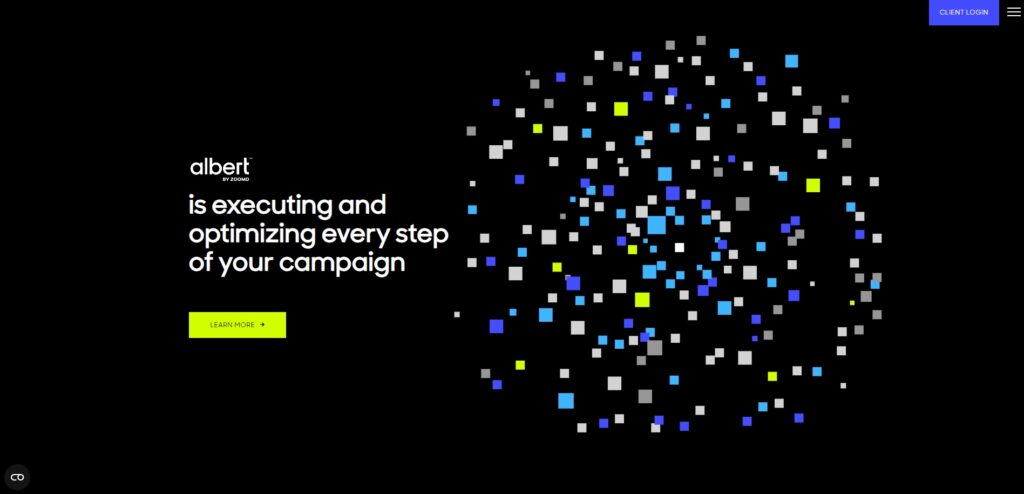
SEO and Content Optimization
AI is transforming the landscape of Search Engine Optimization (SEO) and content optimization, enabling SaaS companies to create more effective and targeted content that ranks higher in search results.
Key applications of AI in SEO and content optimization include:
Keyword Research and Analysis:
AI tools can analyze search trends and competitor data to identify high-potential keywords and topics.
- Example Tool: Ahrefs
Content Gap Analysis:
AI can identify areas where your content is lacking compared to competitors or user needs.
- Example Tool: MarketMuse
Content Optimization:
AI-powered tools can analyze your existing content and provide recommendations for improvement based on top-ranking pages.
- Example Tool: Clearscope
Natural Language Processing (NLP) for SEO:
AI can help optimize content for semantic search and user intent.
- Example Tool: Frase
Automated Content Briefs:
AI can generate detailed content briefs based on top-performing content for specific keywords.
- Example Tool: Surfer SEO
Image and Video Optimization:
AI can analyze and optimize visual content for better search engine visibility.
- Example Tool: Cloudinary
Voice Search Optimization:
AI tools can help optimize content for voice search queries, which are becoming increasingly important.
- Example Tool: Authoritas
Predictive SEO:
AI can forecast potential search ranking changes and traffic based on proposed optimizations.
- Example Tool: BrightEdge
Automated Internal Linking:
AI can analyze your site structure and suggest optimal internal linking strategies.
- Example Tool: Link Whisper
SERP Feature Optimization:
AI can provide insights on how to optimize content for featured snippets, knowledge panels, and other SERP features.
- Example Tool: SEMrush
Automated Directory Listing:
AI can auto-submit your product to online directories for better search engine visibility.
- Example Tool: Quicklisting
Implementing AI-driven SEO and content optimization can lead to improved search rankings, increased organic traffic, and better engagement with your target audience.
However, it’s important to remember that while AI can provide valuable insights and automation, human creativity and strategic thinking are still crucial for creating truly compelling content.
With these AI capabilities, SaaS companies can create more effective content strategies that not only rank well in search engines but also provide real value to their target audience.
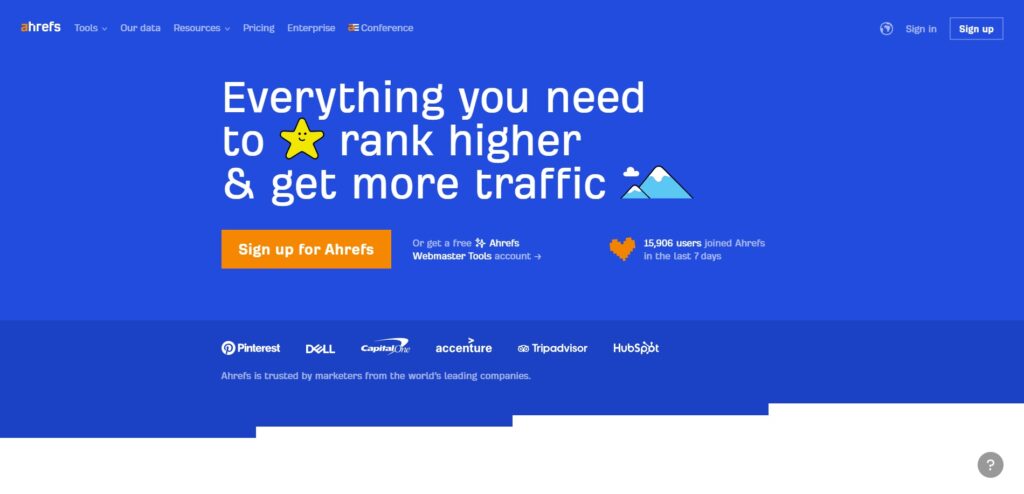
Pricing Optimization
Pricing is a decisive aspect of SaaS marketing, and AI is revolutionizing how companies approach pricing strategies.
By analyzing vast amounts of data and market conditions, AI can help SaaS developers optimize their pricing models for maximum revenue and customer satisfaction.
Key applications:
Dynamic Pricing:
AI algorithms can adjust prices in real-time based on factors such as demand, competitor pricing, and customer segments.
- Example Tool: Prisync
Competitor Analysis:
AI-powered tools can continuously monitor and analyze competitor pricing strategies.
- Example Tool: Kompyte
Price Elasticity Modeling:
AI can predict how changes in price will affect demand for your SaaS product.
- Example Tool: Pros Pricing
Personalized Pricing:
AI can suggest personalized pricing offers based on individual customer characteristics and behavior.
- Example Tool: Pricefx
Upsell and Cross-Sell Optimization:
AI can identify optimal opportunities and pricing for upselling and cross-selling to existing customers.
- Example Tool: Vendavo
Subscription Plan Optimization:
AI can analyze usage patterns to suggest optimal tiered pricing structures for subscription-based SaaS products.
- Example Tool: Zuora
Promotional Pricing Optimization:
AI can determine the most effective promotional pricing strategies and durations.
- Example Tool: Zilliant
Regional Pricing Optimization:
AI can analyze regional market conditions and purchasing power to suggest optimal pricing for different geographic areas.
- Example Tool: Competera
Implementing AI-driven pricing optimization can result in increased revenue, improved customer acquisition and retention, and a more competitive market position.
Though, it’s crucial to balance AI-driven pricing decisions with your overall business strategy and brand positioning.
Using these tools, SaaS companies can create more sophisticated, data-driven pricing strategies that maximize revenue while ensuring customer satisfaction and long-term loyalty.
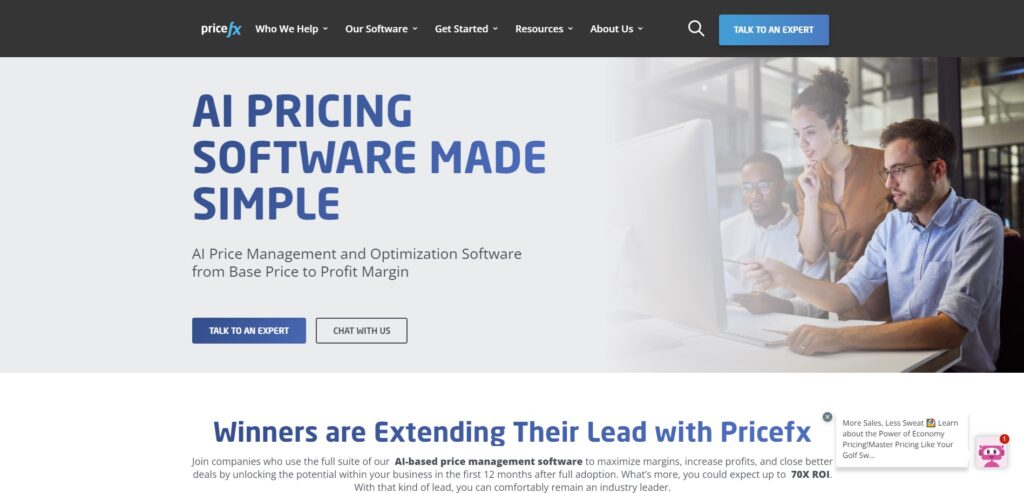
Customer Retention and Churn Prediction
For SaaS companies, retaining existing customers is often as important as acquiring new ones.
AI is playing an increasingly crucial role in predicting and preventing customer churn, as well as enhancing overall customer retention strategies.
Key applications of AI in customer retention:
Churn Prediction Models:
AI algorithms can analyze user behavior, engagement patterns, and other data points to identify customers at risk of churning.
- Example Tool: Dataiku
Customer Health Scoring:
AI can create and continuously update customer health scores based on multiple factors, helping identify at-risk accounts.
- Example Tool: Gainsight
Proactive Customer Engagement:
AI can trigger personalized interventions or offers when it detects signs of potential churn.
- Example Tool: Totango
Usage Pattern Analysis:
AI can analyze product usage patterns to identify features that drive retention or indicate potential churn.
- Example Tool: Amplitude
Sentiment Analysis:
AI-powered tools can analyze customer communications and feedback to gauge satisfaction levels and identify potential issues.
- Example Tool: Qualtrics
Personalized Retention Campaigns:
AI can design and execute tailored retention campaigns based on individual customer characteristics and behavior.
- Example Tool: Optimove
Customer Lifetime Value Prediction:
AI models can forecast the long-term value of customers, helping prioritize retention efforts.
- Example Tool: Custify
Automated Customer Success Playbooks:
AI can trigger and manage automated workflows to drive customer engagement and success.
- Example Tool: Planhat
Win-back Campaign Optimization:
For customers who have churned, AI can optimize win-back strategies and timing.
- Example Tool: Bloomreach
Implementing AI-driven customer retention and churn prediction strategies can lead to improved customer lifetime value, reduced churn rates, and more efficient allocation of customer success resources.
Nevertheless, it’s important to combine these AI insights with human touch points to maintain strong customer relationships.
By leveraging these AI capabilities, SaaS companies can create more proactive, personalized retention strategies that keep customers engaged and satisfied over the long term.
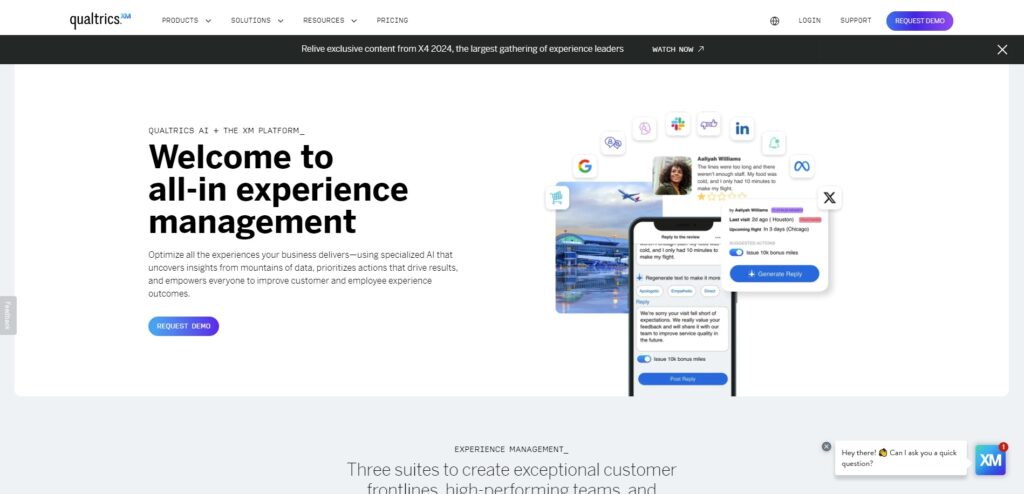
Conclusion
As we’ve explored throughout this comprehensive guide, AI is revolutionizing the way SaaS creators approach marketing.
From content creation to predictive analytics, AI-powered tools are enabling businesses to operate more efficiently, make data-driven decisions, and deliver more value to their customers.
The key takeaways for SaaS marketers looking to employ AI include:
- Embrace AI as a powerful assistant rather than a replacement for human creativity and strategic thinking.
- Start small by implementing AI in one or two areas, then expand as you see results and gain confidence.
- Continuously monitor and refine your AI-driven strategies to ensure they align with your business goals and values.
- Stay informed about emerging AI technologies and their potential applications in SaaS marketing.
- Prioritize data privacy and ethical use of AI to maintain customer trust.
As AI technology continues to evolve, it will undoubtedly open up new opportunities for SaaS marketing innovation.
By staying ahead of the curve and thoughtfully integrating AI into your marketing stack, you can gain a significant competitive advantage in the crowded SaaS marketplace.
The most successful AI implementations in SaaS marketing strike a balance between automation and human touch.
Leverage the strengths of both to create marketing strategies that are not just efficient, but also genuinely resonate with your target audience.

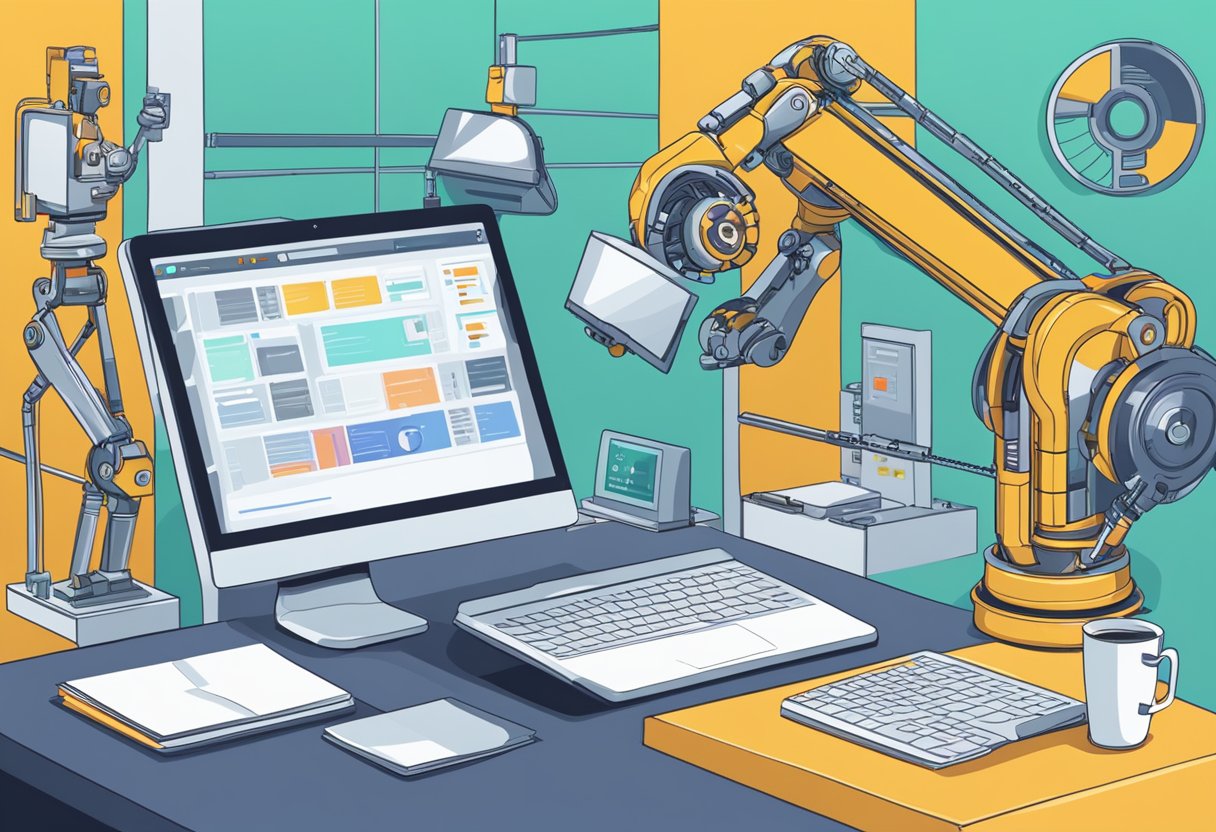

I really enjoyed reading this article. The points you made were very well explained and easy to understand.